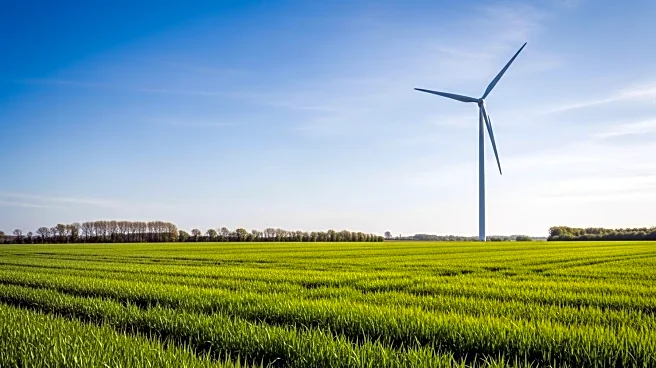What's Happening?
Tesco has announced a new financial incentive program aimed at over 400 British farmers, potentially providing them with more than £9.5 million in additional payments during the first year. Starting in September, 260 UK dairy farmers who are part of Tesco's Sustainable Dairy Group will receive up to an extra 2.5p per litre of milk if they meet specific targets related to emissions reduction, animal health, feed conversion efficiency, and genetic improvements. The initiative also includes a 'baselining' exercise to set targets for soil, water, and biodiversity improvements. Similar incentive plans are being rolled out for Tesco's sustainable lamb and pig groups, focusing on metrics such as animal welfare, biodiversity, soil health, and emissions reduction. This move is part of Tesco's broader strategy to transition to a low-carbon agriculture industry, as outlined in its Greenprint for UK farming report.
Why It's Important?
The introduction of these incentives is significant as it aligns with broader environmental goals and supports the transition to sustainable farming practices. By financially rewarding farmers for meeting specific sustainability targets, Tesco is encouraging the adoption of practices that reduce carbon emissions and improve animal welfare. This initiative not only benefits the farmers economically but also contributes to the UK's efforts to combat climate change. The program reflects a growing trend in the retail industry to incorporate sustainability into business models, potentially influencing other companies to adopt similar strategies. The success of this initiative could lead to more widespread changes in agricultural practices, benefiting both the environment and the economy.
What's Next?
Tesco plans to continue its sustainability efforts by expanding the incentive program to other farming groups and incorporating more environmental metrics. The company is also exploring new payment models and incentives as part of its Greenprint for UK farming report recommendations. As the program progresses, Tesco will likely monitor the impact of these incentives on farmers' practices and the overall reduction in carbon emissions. The initiative may prompt other retailers and stakeholders in the agriculture sector to consider similar approaches, potentially leading to broader industry changes. Additionally, the government may take note of these efforts and consider policy adjustments to support sustainable farming.
Beyond the Headlines
This initiative highlights the ethical and environmental responsibilities of large corporations in driving sustainable practices. By setting clear targets and providing financial incentives, Tesco is not only supporting farmers but also contributing to a cultural shift towards sustainability in agriculture. The program underscores the importance of collaboration between businesses and farmers in achieving long-term environmental goals. It also raises questions about the role of government in facilitating such transitions and the potential for public-private partnerships to enhance sustainability efforts.









